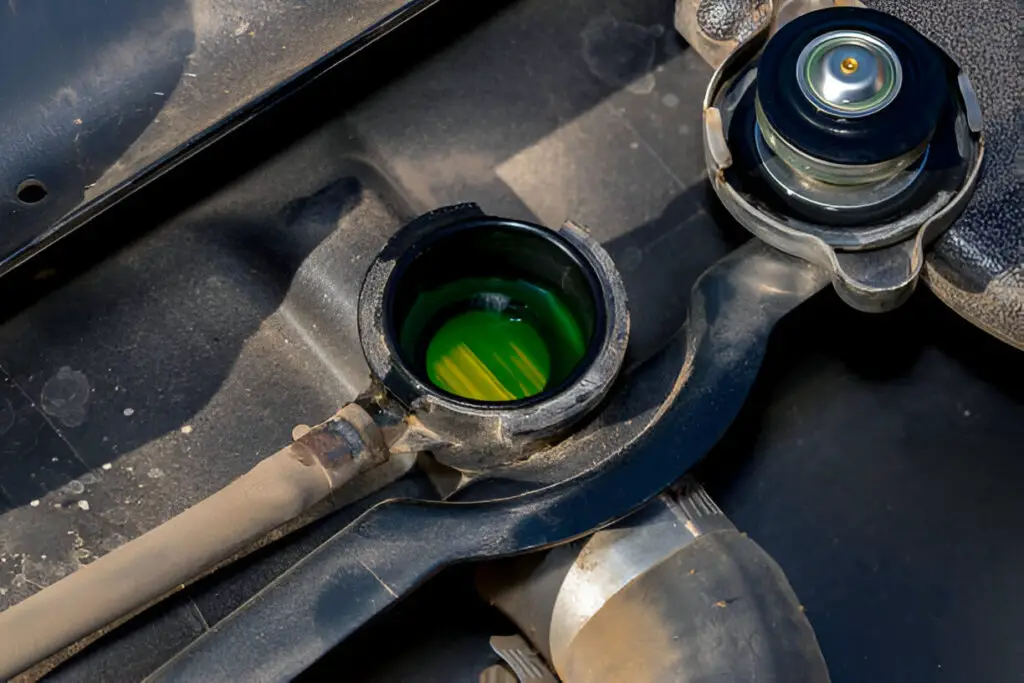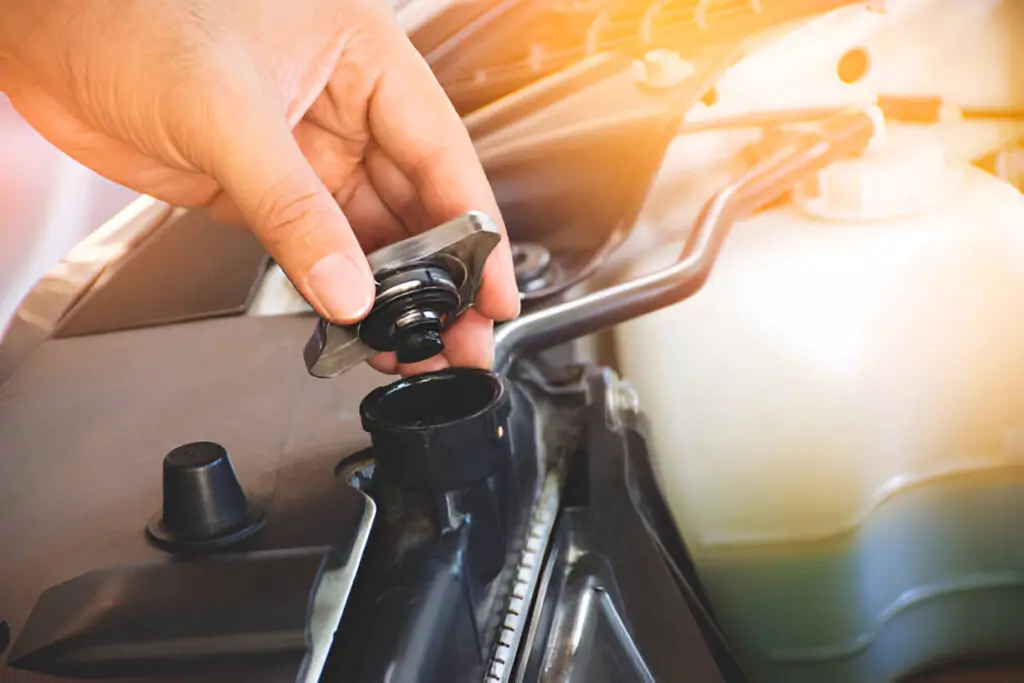Engine coolant can evaporate under certain conditions, such as overheating or if there’s a leak in the cooling system. However, in a properly sealed system, coolant should not evaporate significantly.
Engine coolant, also known as antifreeze, plays a crucial role in maintaining the temperature of your vehicle’s engine. It helps prevent overheating in hot weather and freezing in cold temperatures, ensuring the engine runs smoothly under various conditions. However, you might notice that the coolant level in your reservoir drops over time, prompting the question: Does engine coolant evaporate?
In this blog post, we’ll dive deep into this question, explore the reasons behind coolant loss, explain how coolant works, and offer tips on how to maintain your vehicle’s cooling system. We’ll also answer five frequently asked questions (FAQs) on the topic.

Contents
What is Engine Coolant?
Engine coolant is a specially formulated liquid that regulates engine temperature by absorbing heat produced by the engine. It typically consists of a mixture of water and antifreeze chemicals, such as ethylene glycol or propylene glycol. Coolant circulates through the engine via the cooling system, absorbing heat from the engine and then dissipating it through the radiator.
The primary functions of engine coolant include:
- Temperature Regulation: It keeps the engine from overheating in hot conditions and prevents it from freezing in cold weather.
- Corrosion Prevention: Coolant includes anti-corrosion additives that protect metal components in the engine and cooling system.
- Lubrication: It helps lubricate moving parts like the water pump, reducing wear and tear.
Does Engine Coolant Evaporate?
While engine coolant can technically evaporate under certain conditions, it’s not designed to do so under normal operating circumstances. A properly functioning cooling system is sealed, which prevents the coolant from escaping. However, some evaporation can occur over time, especially if there’s an issue with the system, such as leaks or excessive heat.
Factors Contributing to Coolant Evaporation
Several factors can contribute to coolant evaporation, including:
- Overheating: When an engine runs too hot, it can cause the coolant to boil and evaporate, leading to a drop in coolant levels. This often happens if the cooling system is malfunctioning, such as when there’s a blocked radiator, broken thermostat, or a failing water pump.
- Leaking System: Even small leaks in the radiator, hoses, or other cooling system components can cause coolant to escape and evaporate. Leaks may be hard to detect if they’re slow or if the coolant evaporates as soon as it leaks.
- Faulty Radiator Cap: The radiator cap maintains pressure within the cooling system, allowing the coolant to boil at a higher temperature. If the cap is damaged or faulty, it can cause the coolant to boil at a lower temperature, leading to evaporation or loss of coolant.
- Evaporation from the Reservoir: Coolant in the overflow reservoir can evaporate slowly over time, especially if the cap is not sealed properly or if it’s exposed to extreme heat. This is more likely in older vehicles or those with cooling system issues.
- Improper Coolant Mixture: If the coolant mixture contains too much water and not enough antifreeze, it can boil off more easily at higher temperatures, leading to evaporation. The ideal ratio is typically 50/50 water and antifreeze, but this can vary based on the climate.

Normal Coolant Loss vs. Problematic Coolant Loss
It’s important to differentiate between normal coolant loss and coolant loss due to a mechanical problem. Normal coolant loss might occur over time due to minor evaporation from the overflow tank or small leaks. You might see a small drop in coolant levels every few months, and topping off the coolant might be enough.
However, significant coolant loss in a short period of time usually indicates a problem, such as a leak or overheating issue. If you need to top off your coolant frequently, it’s a sign that you should have your cooling system inspected by a mechanic.
How to Prevent Coolant Loss
To prevent excessive coolant evaporation or loss, regular maintenance of the cooling system is essential. Here are some key steps to keep your coolant system in good condition:
- Check Coolant Levels Regularly: Periodically check the coolant levels, especially before long trips or during seasonal changes. If the level is low, top it off with the appropriate mixture of coolant and water.
- Inspect for Leaks: Look for signs of coolant leaks, such as puddles under your vehicle, a sweet smell near the engine, or white exhaust smoke. If you suspect a leak, have it addressed promptly to prevent further damage.
- Monitor the Temperature Gauge: Pay attention to your vehicle’s temperature gauge. If it consistently runs hot or if you notice sudden spikes in temperature, this could be a sign of a cooling system issue. Overheating can lead to coolant evaporation or damage to engine components.
- Replace the Radiator Cap: A faulty radiator cap can cause pressure problems in the cooling system, leading to coolant loss. If your radiator cap is old or damaged, replace the radiator cap with a new one to ensure proper pressure regulation.
- Flush the Coolant System: Over time, contaminants can build up in the cooling system, reducing its efficiency. It’s a good practice to flush the coolant system every 30,000 miles (or as recommended by your vehicle’s manufacturer) to remove old coolant and debris.
- Use the Right Coolant Mixture: Ensure that you’re using the correct mixture of antifreeze and water. In most climates, a 50/50 mix is ideal, but colder regions may require a higher concentration of antifreeze. Always follow your vehicle’s manufacturer recommendations for the correct coolant type.
How Coolant Works and Why It’s Important
The cooling system in a vehicle is designed to regulate the engine’s temperature by circulating coolant through channels in the engine block. The coolant absorbs heat as it flows through the engine, and this heated fluid is then transferred to the radiator, where the heat is released into the air. The cooled fluid is then recirculated back into the engine, repeating the process.
Without a proper coolant system, your engine would overheat, which can cause severe damage, including:
- Warped Cylinder Heads: Overheating can cause the metal in the engine to warp, leading to leaks in the head gasket and reduced engine performance.
- Blown Head Gasket: Excessive heat can cause the head gasket to fail, leading to oil and coolant mixing, which can further damage the engine.
- Engine Seizure: If the engine gets too hot, components can expand and seize, potentially resulting in complete engine failure.
Coolant plays a crucial role in preventing these issues by regulating the engine’s temperature and ensuring it stays within a safe operating range.
Frequently Asked Questions
Here are some FAQs about coolant –
1. Can coolant evaporate without a leak?
Yes, coolant can evaporate if the engine runs too hot, causing the coolant to boil off. However, significant evaporation without a leak is uncommon. In most cases, if you’re losing coolant, there’s likely a small leak somewhere in the system.
2. How often should I check my coolant level?
It’s a good idea to check your coolant level every few months, or more frequently if you notice any signs of overheating or leaks. Always check it before long road trips to ensure there’s enough coolant in the system.
3. Why does my coolant level keep dropping?
A consistently dropping coolant level could indicate a leak, a faulty radiator cap, or an issue with the cooling system, such as a malfunctioning thermostat. If you need to top off your coolant frequently, it’s best to have a mechanic inspect the system.
4. Can I drive with low coolant?
Driving with low coolant is not recommended, as it can lead to overheating, which may cause severe engine damage. If you notice your coolant level is low, it’s important to top it off or address the issue before continuing to drive for extended periods.
5. How do I know if my radiator cap is faulty?
A faulty radiator cap can cause pressure problems in the cooling system, leading to coolant loss or overheating. Symptoms of a bad radiator cap include a fluctuating temperature gauge, visible coolant leaks around the cap, or steam coming from the engine. Replacing the cap is a simple fix that can prevent bigger problems down the road.
Conclusion
While engine coolant doesn’t evaporate under normal conditions, factors like overheating, leaks, or a faulty radiator cap can cause coolant to escape or evaporate. Maintaining the cooling system is critical for ensuring your vehicle runs smoothly and avoids engine damage. By regularly checking coolant levels, inspecting for leaks, and using the correct coolant mixture, you can keep your engine cool and your vehicle in top shape.
If you notice frequent coolant loss, it’s essential to have your vehicle checked by a professional mechanic to prevent overheating or costly engine repairs.